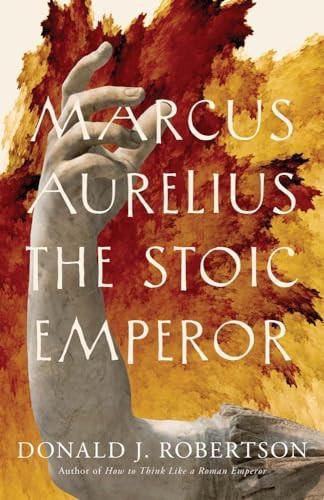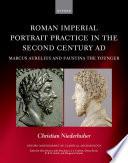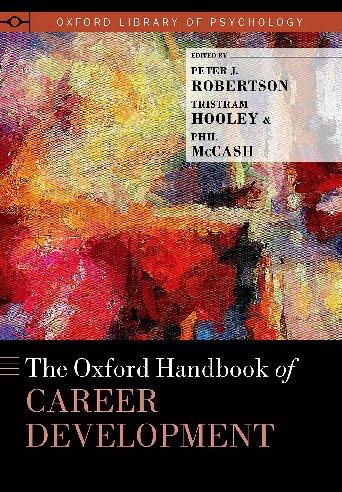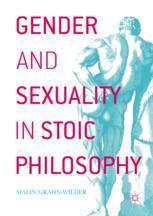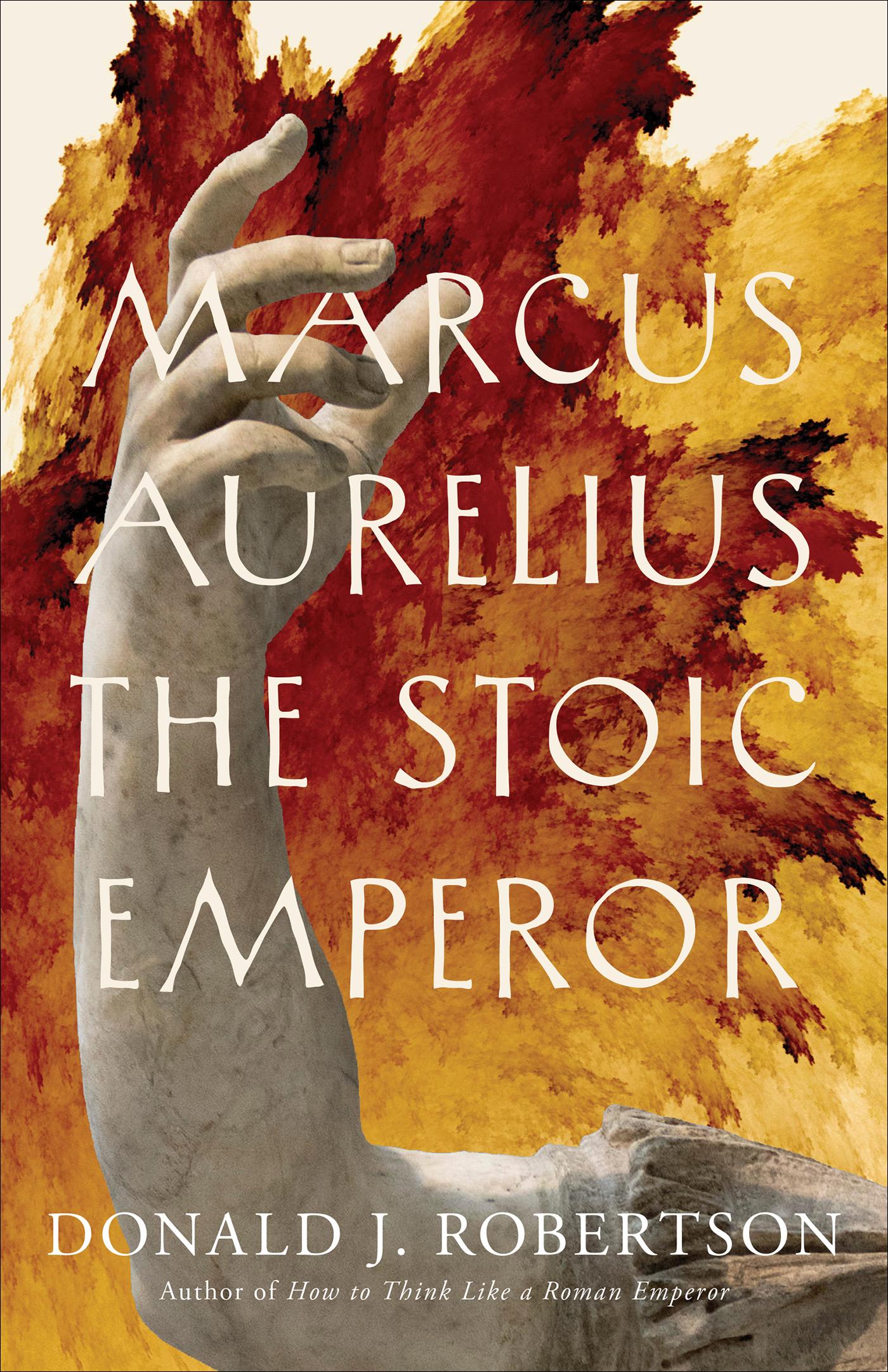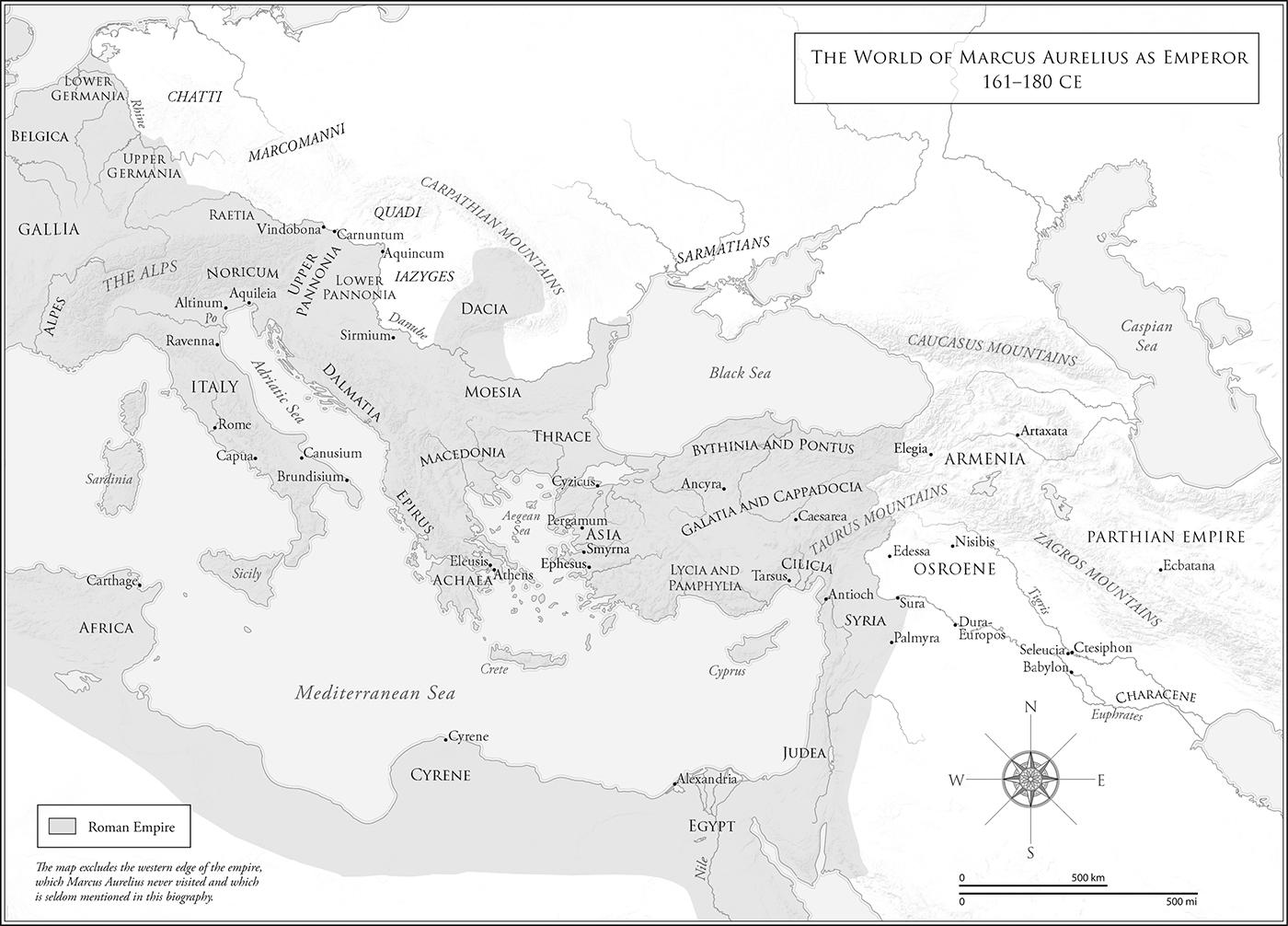Prologue
TRUTH IN THE MEDITATIONS
Marcus Aurelius did not have a heart of stone. When the news was brought to him that one of his most beloved tutors had died, the young Caesar was distraught, and tears poured down his cheeks —he may perhaps have started to beat his chest and tear his clothes in grief. Palace servants, afraid his reputation would be harmed by such a public display of raw emotion, rushed to his side, trying to restrain him. His adoptive father, the emperor Antoninus Pius, a thoughtful and gentle man, gestured for them to step aside. He whispered, “Let him be only a man for once; for neither philosophy nor empire takes away natural feeling.”1
Such displays of emotion were not out of character for Marcus. We hear of him in his fifties, as emperor, being moved to tears when an advocate giving a speech uttered the words, “Blessed are those who died in the plague!”2 Toward the end of his life, the emperor likewise found himself weeping over a letter informing him that a catastrophic earthquake had leveled the city of Smyrna (modern-day Izmir, Turkey). His tears soaked the parchment as he read, “She is a desert through which the west winds blow.”3 He was a man capable of knowing intense grief. Perhaps especially for that reason, he committed himself to a lifelong training in philosophy: Marcus came to realize that although a great leader may experience sorrow or anger, he cannot allow intense emotion to cloud his judgment.
Throughout his personal notebooks, known today as the Meditations,Marcus returns many times to one central question: How can we prevent reason from being usurped by the passions? If we focus on what is before us, he concluded, following reason from moment to moment “with heroic truth in every word,” we will be achieving the goal of life.4 The pages of the Meditationsshow its writer again and again striving to maintain a rational and brutally honest attitude toward life’s most troubling events, from personal tragedies, such as the loss of his beloved tutor, to international catastrophes, such as the great wars that Rome faced during his time as emperor.
This was no bookish or academic philosophy but rather a way of life. The love of truth was almost a religion to Marcus. The divine Nature of the universe and all that exists, he believed to be synonymous with a primordial goddess named Truth, or Aletheia.5 Liars and the self-deceived are guilty of impietybecause they place themselves at odds with divine Nature. The philosopher who lives in accord with truth, by contrast, is “like a priest and minister of the gods.”6 Indeed, Rome’s emperor held the office of pontifex maximus, supreme priest. Marcus doubtless saw his commitment to philosophical truth as an integral part of fulfilling his religious obligations, both as an individual and as the head of state.
He was, moreover, a student of humannature whose search for truth extended to the lives of others, even leading him to experiment with writing biographies. As a young man, he sought the guidance of his rhetoric master on the methods to employ in composing a history.7 In addition to his own memoirs he began work on his Acts ofAncientGreeksandRomans,though he eventually scrapped both projects.8 Studying the character of others became a contemplative exercise for him; as he writes in the Meditations,“Accustom yourself to attend carefully to what is said by another, and as much as it is possible, be in the speaker’s mind.”9
We can perhaps see evidence of Marcus’s own character evolving in his writings. The lively and good-humored letters of his youth focus on his studies in rhetoric and the trivia of daily life—aches and
pains, family vacations, squabbles among his friends. It is hard to reconcile them with the author, decades later, of the Meditations, which strikes a more solemn and reflective note. (Although, to some extent this is to be expected as the Meditationsis a different type of writing.) Perhaps we can detect a similar transformation in various sculptures made of him during his lifetime. In his prime, some show him arching his eyebrows, as if considering a problem with studied logic. In others, his eyes are turned dreamily upward, as though contemplating the heavens.10 Statues portraying the emperor toward the end of his life present him gazing dead ahead, his features fallen into a look of solemn resignation. The former befit an aspiring philosopher, the latter a seasoned military commander who has lived through war after war and witnessed a horrific plague.
If we are going to enter the mind of the Stoic emperor, however, we need to consider the evidence of his thoughts and actions carefully. Marcus had a philosophy of life which differs significantly from the prevailing values of any modern society. Some of his recent biographers have dealt rather dismissively with the Stoic philosophy that played such an important role in his life: “A more priggish, inhuman, killjoy and generally repulsive doctrine [than Stoicism] would be hard to imagine,” sneers one, “but it will be abundantly clear why the programme appealed to Marcus Aurelius.”11 Such a view of Stoicism is a caricature based on popular misconceptions, and it does the philosophy no justice. Stoicism flourished for five centuries in the ancient world, and numerous proponents spoke to its benefits and appeal. Today thousands of psychological research studies provide scientific evidence for the effectiveness of modern cognitive psychotherapy, which was originally inspired by the Stoics.12 Many modern readers likewise find in Stoicism a profoundly life-changing philosophy—one which heals certain emotions rather than merely eliminating all of them.
Trying to write a biography of Marcus Aurelius without due attention to the influence of Stoicism would, indeed, be as absurd as trying to write about Saint Augustine while ignoring his Christian faith. Marcus was engaged in a process of both moral and
therapeutic self-improvement. We cannot understand his character without understanding why Stoicism became so important to him and how it shaped his actions. In this book I aim, therefore, to weave together evidence of his inner thoughts and values, found in his private notes and letters, with evidence of his outward actions, taken from Roman historians and other ancient sources.
Most readers are interested in Marcus because of the famous book attributed to him. The Meditationshas become one of the most cherished self-improvement classics of all time. It has had a profound influence on countless individuals throughout history, from all walks of life. Modern appreciation of the Meditationsbegan when the first printed edition of the Greek manuscript was published in 1558, bearing the title “To himself” (Taeisheauton), along with a Latin translation. In 1634, the first English translation appeared under the title MarcusAureliusAntoninustheRomanEmperor,His MeditationsConcerningHimself.. . 13 The use of this term eventually stuck, and it is now common therefore to title the book simply Meditations.
So what are the core teachings “to himself” that Marcus Aurelius set down in the Meditations? Most important is “living in agreement with Nature,” which the Stoics defined as humanity’s supreme goal. Although Marcus uses the word “Stoic” only once, he often cites this central maxim of their philosophy. He gives thanks that his Stoic tutors provided him with frequent examples of what “living in agreement with Nature” meant in practice, in their daily lives. He also tells himself that nothing can prevent him from living in agreement with Nature, just as they did, although he often struggled to do so in practice.14
Living “in agreement with Nature,” for the Stoics, meant living rationally, because they considered reason to be the highest human faculty. If we lived consistently in accord with reason, we would perfect our nature and attain the virtue of wisdom. If we applied such wisdom in our relationships with others, treating them honestly and fairly, we would achieve the socialvirtue of justice. In order to live more fully in accord with wisdom and justice, though, we need
to master the fears and desires that threaten to lead us astray. This calls for courage and moderation, giving us the four cardinal virtues of ancient Stoicism: wisdom, justice, fortitude, and temperance. The Stoic goal of life can be understood in this sense as “living in accord with virtue,” as long as we bear in mind that the Stoics took all the virtues to be forms of moral wisdom.
Although the wise are not highly perturbed by misfortune, neither are they completely unfeeling. Marcus Aurelius, as we’ve seen, could be a sensitive man. He gradually trained himself to manage his emotions by examining them rationally rather than merely suppressing them. Stoicism taught him to view external events—events beyond his direct control—as of secondary importance. He learned a kind of psychological therapy, designed to free him from unhealthy passions, a state of mind called apatheiaby the Stoics. (The word in Stoic philosophy is closer to “freedom from pathological emotions” than what we mean today by “apathy.”)
Almost everything Marcus says about philosophy can be related back to the basic goal of living in agreement with Nature, free of unhealthy emotions. Throughout this book I have interspersed more than a hundred such citations from the Meditationsto highlight the connections between its author’s Stoic principles and the way he actually conducted himself in life.
Who was Marcus Aurelius the man, though? Many today came to know him through his portrayal by Richard Harris in the movie Gladiator(2000), and a few may recall Alec Guinness in TheFallof theRomanEmpire(1964)—but these films are only loosely based on history. As it happens, we know more about Marcus Aurelius’s biography than that of any other Stoic or of almost any other ancient philosopher. Three main Roman histories survive that describe his life and character: the RomanHistoryof Cassius Dio, the Historyof theEmpirefromtheDeathofMarcusby Herodian, and the multiauthor AugustanHistory.15 We also possess a cache of private letters between Marcus and his rhetoric tutor Marcus Cornelius Fronto that give us exceptional insight into his private life as Caesar (designated
heir of the emperor) and later as emperor himself. (These and other sources are described in more detail in the Source Notes.)
In these sources, we encounter colorful characters with whose lives Marcus Aurelius’s story was intertwined. The emperor Hadrian, for instance, features prominently in this book because he had a profound influence on the boy’s upbringing. Marcus Aurelius was born under Hadrian’s rule, later adopted as his grandson, and even brought to live in his villa during the final months of Hadrian’s life. Hadrian has a reputation today as one of the better emperors, which he owes in part to Marguerite Yourcenar’s celebrated novel Memoirs ofHadrian:as one of his other biographers notes, “It is no exaggeration to say that for a while Mme. Yourcenar supplanted the academics. Her Hadrian was received as a true image of the real thing.”16 Yourcenar’s book, considered by many to be a literary masterpiece, draws on careful research. It was, however, intended as a work of historical fiction, and it portrays Hadrian far more sympathetically than is justified by the historical evidence. It is written from Hadrian’s perspective in the form of letters from him to the young Marcus Aurelius, whose replies we never see. The book you are currently reading is more concerned with that boy’s story— and Marcus Aurelius had nothing positive to say about Hadrian.
Hadrian’s name is conspicuously absent from book 1 of the Meditations,which lists the sixteen family members and tutors whose qualities Marcus most admires. That book is, in a sense, his autobiography, though perhaps it would be better to call it a fragment of an autobiography, as the author tells us only how specific individuals inspired him. He leaves out the others, such as the many critics of his rule who opposed him or came to see him as their enemy. He also omits virtually any reference to the major events of his life. In this modern biography I build on these fragments, and other sources, to show how Marcus took inspiration from his family and his tutors as a young man, and how he proceeded to apply the Stoic philosophy they taught him to the enormous challenges he faced as emperor.
CHAPTER ONE
The Mother of Caesar
“Piety and kindness,” writes his frail hand, listing qualities the author learned from his mother, “and abstinence not only from evil deeds, but even from evil thoughts.”1 Marcus Aurelius is in his fifties. It is late at night and the frigid winter air of Aquincum (modern-day Budapest) has brought on his familiar hacking cough. As usual, he has difficulty sleeping. Outside the praetorium,his headquarters at the center of the legionary fortress, everything is deceptively silent. The Praetorians, his personal regiment, are camped in nearby barracks. The whole empire has been devastated by a horrific pandemic, which would eventually be named the Antonine Plague, after Marcus Aurelius Antoninus’s imperial dynasty. The First Marcomannic War still rages along the Danube frontier. The army is exhausted from fighting one battle after another against the enemy tribes, the Quadi and Iazyges, on the other side of the river. In the midst of all these troubles, the emperor is writing his personal notes on the application of Stoic philosophy. He pauses momentarily to gaze upon a wood-panel portrait of Lucilla, his mother. Slowly turning over the lesson that he learned from her half a century earlier, he must have asked himself, How can a man learn to abstain even from the very thoughtof doing wrong?
Domitia Lucilla, also known as Domitia Calvilla, gave birth to her first child, Marcus Annius Verus—the future Roman emperor Marcus
Aurelius—on April 26, 121 CE. His only sibling, a sister named Annia Cornificia Faustina, arrived a year later. The children were born into a wealthy patrician family with close ties to Hadrian, the ruling emperor. Later, Marcus would study under several of Rome’s finest rhetoricians and philosophers, but Lucilla, his mother, would have been his first teacher.
They were clearly very close. Long before Marcus began any formal education, his mother had sown within him the seeds of a love for Greek literature and philosophy. She also taught him to pay close attention to his thoughts and look deep within himself, examining his own motives and values. Doing good outwardly is not enough; the real goal of life is to be good in ourselves.
“Look within. Within is the fountain of good, and it will ever bubble up, if you will ever dig.”2
Lucilla’s early concern with moral self-examination bore fruit for her son throughout his life, but most notably decades later, when he began writing the Meditations.
“My little mother,” Marcus calls her affectionately in his letters, but she must have commanded great respect as one of the wealthiest and most powerful women in Rome. From her parents she had inherited extensive clay fields, and a large brick-and-tile factory on the banks of the Tiber, which had produced the materials used in the construction of the Colosseum, Pantheon, and Market of Trajan. Archaeologists have unearthed many bricks with her name stamped on them; it would appear that Marcus’s “little mother” was one of the leading magnates of the Roman construction industry at the start of the second century CE. Marcus admired her exceptional generosity (today we would call her a philanthropist), and he later expressed gratitude that thanks to her he had the resources to help those who were short of money or needed other forms of assistance.3
Marcus grew up around his mother’s circle of friends, who included some of the leading intellectuals in the empire. Lucilla was a natural Hellenophile. Indeed, her side of the family claimed descent from a legendary king, Malemnius, who founded a
prominent city on Italy’s Salentine peninsula, Lupiae, where Greek colonists had settled in the distant past. (The surrounding region to this day retains strong cultural ties to Greece.) Roman Hellenism ran in her veins, and she was known for her exceptional grasp of the Greek language. Fluency in Greek had been fashionable since the latter part of Nero’s reign, half a century earlier, when Rome experienced the renaissance in the appreciation of Greek culture known as the Second Sophistic. The Sophists were Greek orators who discussed literature with their students but also claimed to impart moral lessons about virtue. Hence, the word sophistication, the quality that the parents of young Roman nobles hoped their sons might acquire from foreign intellectuals. Although most wealthy Romans at this time were bilingual in the two languages, Lucilla’s exceptional mastery of Greek is evident. Marcus Cornelius Fronto, the preeminent Latin rhetorician of his day, wrote letters in Greek addressed “To the Mother of Caesar” and somewhat pathetically begged Marcus to proofread one: “I have written your mother a letter, such is my assurance, in Greek, and enclose it in my letter to you. Please read it first, and if you detect any barbarism in it, for you are fresher from your Greek than I am, correct it and so hand it over to your mother. I should not like her to look down on me as a goth.”4 Marcus had close ties with the Second Sophistic through Lucilla’s side of the family. Her maternal (adoptive) grandfather, Lucius Catilius Severus, a military veteran and senior Roman statesman favored by the emperor, was a major patron of the Sophists. Catilius also took special interest in the education of his family. Owing to his generosity, Marcus received instruction at home from the finest private tutors, rather than depending on public lectures.5 Foremost among their circle was the celebrated Greek orator Herodes Atticus, who was raised in the household of Marcus’s great-grandfather. Lucilla grew up alongside the leading figure of the Second Sophistic, of whom another orator once exclaimed, “O Herodes, we Sophists are all of us merely small slices of yourself!”6 Marcus had a lifelong respect for the verbal prowess of Herodes and other Greek rhetoricians. As a budding orator, he was bound to compare himself
to them. Nevertheless, he would later say that he was grateful that he avoided falling under their spell.
Lucilla was also good friends with Fronto, Herodes’ Latin counterpart. Fronto’s correspondence mentions Lucilla as a close friend of his young wife, Gratia, whom she evidently took under her wing. They probably read Greek literature together. It is a striking testimony to Marcus’s mother that Fronto, one of the empire’s most acclaimed teachers, regarded her as a mentor to his own wife. Lucilla simultaneously fostered an intellectual atmosphere in her own household, encouraging her son, and perhaps also her daughter, to associate with artists and thinkers who would shape their character for the rest of their lives.
Although it goes unmentioned in Marcus’s brief character sketch of his mother, Lucilla exhibited another notable virtue: natural affection.Marcus came to agree with Fronto that generally speaking, “those among us who are called Patricians are rather deficient” in precisely this quality.7 Wealthy Roman slaveowners and the baying audiences at gladiatorial contests may appear to have been numb to human suffering. However, individuals can always be found who stand apart from their contemporaries. The Greek word Marcus and Fronto used of such people, philostorgia,which normally refers to the love of close family members for one another, is central to Stoic ethics. Philostorgiais sometimes translated as “natural affection,” “parental love,” or “familial love,” although we might best describe it as resembling the Christian concept of brotherlylove. Paul equates the two terms in the New Testament: “Be kindly affectionate [philostorgoi] to one another with brotherly love [philadelphia].”8
The Stoics believed that such “natural affection” should extend to everyone, as all rational beings are viewed by the wise as their brothers and sisters. In his letters, Fronto more than once makes the striking claim that the Latin language has no equivalent word for philostorgia,as in his description of a friend: “His characteristics, simplicity, continence, truthfulness, and honour plainly Roman, a warmth of affection, however, possibly not Roman, for there is nothing of which my whole life through I have seen less at Rome
than a man unfeignedly φιλόστοργος [philostorgos]. The reason why there is not even a word for this virtue in our language must, I imagine, be, that in reality no one at Rome has any warm affection.”9 It is clear from Fronto’s correspondence that he viewed Marcus and Lucilla as exceptions, among the few patricians in Rome who were capable of exhibiting the natural affection held in such regard by philosophers. Indeed, Marcus’s warmth and affection toward his friends is displayed throughout the correspondence with his Latin master. He even praises Fronto, on one occasion, by comparing his eloquence to Lucilla’s.10 She could almost be considered a Sophist herself, were it not that women rarely engaged in public speaking at this time, and her manner appears more plainspoken and less affected than that of the typical Greek rhetorician.
If we can see beyond Fronto’s rather shameless toadying, his letters provide us with additional insights into Lucilla’s character and her influence upon her son. Fronto celebrates the virtues for which Marcus’s mother was known in a letter he sent her on her birthday in which he compares her to Athena, the Greek goddess of wisdom.11 He portrays Lucilla as a woman known for having had great love, or natural affection, toward her husband, and for loving her children. The letter suggests that she is seen as virtuous yet modest, goodnatured, approachable, and kind. She is also portrayed as a straightforward, honest woman. Fronto concludes by saying that he would bar from Lucilla’s birthday celebrations any persons who made “a pretense of good-will” and were “insincere,” those for whom everything from laughter to tears was make-believe, and who, as Homer’s Achilles put it, hid “one thing in their hearts while their lips speak another.”12 He apparently did not see himself in this description, but it surely conjured to mind other rhetoricians of his and Marcus’s acquaintance. Fronto would certainly have insisted that Marcus read his mother’s birthday letter, so it is likely that its portrayal of her met with her son’s approval. Lucilla emerges, in Fronto’s highly contrived compliment, as a woman known for her familial affection, her honesty, and, ironically, her straight talking.
Marcus recognized that these qualities clashed at times with the culture of the Second Sophistic, which elevated insincerity and sycophancy to an art form, and Fronto was arguably not much better than the Greek Sophists in this regard. His birthday letter could be dismissed as mere flattery, but it echoes what Marcus said about his mother privately in the Meditations.Fronto was right: the woman who taught her son not only to avoid doing wrong but to avoid even contemplating a wrong action inwardly would doubtless “hate like the gates of hell” hypocrites of the sort denounced by Achilles in Homer’s Iliad.It is no surprise that such a woman would rear a son who became famous for his love of truthfulness.
Much less is known about Marcus’s father. He was named Marcus Annius Verus, after his own father. Like Lucilla, he was born into a wealthy and influential senatorial family. They hailed from the Roman province of Hispania Baetica (southern Spain), where they had made their fortune from olive oil. Verus’s side of the family claimed descent from Numa Pompilius, the second king of Rome. Renowned as a wise and just ruler, Numa was credited with founding the solemn rites of the Roman religion. A popular tradition, whose historical authenticity was scorned even in antiquity, claimed Numa brought to Rome the teachings of the sixth-century BCE philosopher Pythagoras of Samos, whose Greek followers had settled around the southern tip of the Italian peninsula. Although the Annius Verus family’s historical connection with Numa and Pythagoreanism is probably a myth, it reveals something of their character and reputation. Marcus Aurelius was the latest in a line of reputedly peaceful and high-minded nobles with links to archaic religion and philosophy.
Marcus’s father also had a touch of imperial blood in his veins. He was not only the nephew of Empress Vibia Sabina, wife of Hadrian, but also a distant relative of Emperor Trajan on his mother’s side. His sister Faustina (the Elder) was married to a senator who would later become the emperor Antoninus Pius. Marcus’s aunt was therefore destined to become an Augusta, or empress. Given his family history and imperial connections, Marcus’s father must have been expected
to reach the highest civil office, that of consul. Instead, soon after he reached the preceding rank of praetor, his career was unexpectedly cut short. (The best modern analogy I can think of is that of a man who seems destined to become prime minister and reaches the rank of cabinet minister but is denied the opportunity to achieve his full career potential.)
Sometime in the early 120s, when Marcus was around three or four years old, his father died. We have no more details; we know only that just a few years into her marriage, Lucilla was left a widow caring for two small children. One of our sources claims that “at the beginning of his life” Marcus assumed the name of his maternal great-grandfather, Catilius Severus, which might imply that the old man temporarily adopted him after he lost his father.13 Lucilla was still a teenager or in her early twenties. She never remarried.
This first tragic loss shaped Marcus’s character more than the many others he was to experience. We can detect throughout the rest of his life a constant interplay between his natural sensitivity to grief and a studied philosophical attitude toward his own death and that of others. “Lucilla buried Verus,” he writes bluntly of this first tragic loss, looking back on these events half a century later.14 And so it goes on, he muses, ever the same, with one life after another. His father, Marcus Annius Verus, and all the others were merely “creatures of a day,” gone before long. Yet he, Marcus Aurelius, still recalled them and shed tears for them.
Marcus barely had a chance to know his father. Nevertheless, for the rest of his life, following custom, he would pray before this man’s image in his family shrine (lararium), honoring his memory. Marcus was forced to construct a memory of his father from the fragments of his own childhood recollections and the stories he heard about him. Marcus believed, first and foremost, that his father exemplified both manliness and modesty.15 Later he asserts that the word “manly” (arrenikos), correctly defined, means not being tough and aggressive but kind and full of natural affection. Marcus, I think, remembered his father as the embodiment of a gentle and affectionate man, at odds with the vicious cliques of Roman elite
society. Turning to one male role model after another, Marcus struggled to live up to his father’s example. Like many troubled young men, his own feelings of anger would at times get in his way.
CHAPTER TWO
Verissimus the Philosopher
After the formal nine days of mourning for her husband were over, Marcus’s mother sat by her two young children and explained that their toys were to be packed away by the servants. They were leaving their familiar, beloved home on Rome’s Caelian Hill to move into the nearby villa of Marcus’s paternal grandfather, who also bore the name Marcus Annius Verus. “When his father died,” as the AugustanHistoryputs it, young Marcus “was adopted and reared by his father’s father.”1 At first the young noble felt some anxiety at the prospect of adjusting to a new way of life—he would later compare the transition to a sort of death.2 He nevertheless grew to think of his grandfather as another good man, much like his father.
It was this venerable statesman’s “nobility of character” and “freedom from anger” that made the most lasting impression on his young grandson.3 An even-tempered gentleness seemed to run in the Annius Verus family. Yet Marcus’s time in this household was not entirely untroubled. Marcus’s grandfather was close to Hadrian. Indeed, when the emperor took the throne, in 117 CE, Verus was appointed urban prefect, the senior official in charge of the city of Rome, a position he held for about seven years. Since the end of his grandfather’s tenure in this position coincided with the time Marcus’s father is believed to have died, it is possible that the old statesman had retired from public office in order to help raise his grandson.
The emperor, meanwhile, traveled extensively throughout the provinces and spent much of this time away from Rome. It must have been when Hadrian was in the city, around 125–128, that young Marcus had first caught his attention. The boy was not only part of a wealthy and influential patrician family and the grandson of one of Rome’s most senior statesmen, he was also a grandnephew of the emperor’s wife. Marcus soon became a favorite at court and we are told he was reared “in Hadrian’s lap” (or “bosom,” the Latin gremio).4
A few years later, the emperor chose to honor Marcus by enrolling him in the equestrian order, making him a Roman knight at the age of six. The equites, from equus,“horse” (their predecessors were cavalrymen), were Rome’s second political stratum, below the senatorial class. Marcus was being prepared for a future role in the upper echelons of Roman society. Soon afterward Hadrian left for Athens, but he had already arranged, astutely, for the boy to be enrolled the following year in a religious order known as the College of the Salii.
The arcane chants and rituals of the Salii fascinated young Marcus. His grandfather must have been proud, knowing that the priesthood traced its origins back to King Numa, their family’s legendary ancestor. Marcus joined the other boys who were learning to perform elaborate “leaping” war dances. Their ceremonial dress consisted of bronze cuirasses and embroidered tunics, and they bore archaic shields and daggers.5 Torches blazed, the air thick with incense, as the Salii threw themselves into the air, thumping their shields hypnotically in time to the martial music. In unison with his fellow priests, Marcus chanted the cryptic verses of their ancient hymn, the CarmenSaliare,honoring Mars Gravidus, the god of marching into war.6
For years Marcus was a devoted member of this religious dance troupe, eventually becoming its leader. Decades later, in the Meditations,he seems at times to be drawing on his memories of these days. Some commit themselves so wholeheartedly to dance, he writes, that they exhaust themselves, even going without food
and sleep, as they work obsessively to perfect their art.7 He asks himself why it seems so difficult, then, to exercise similar courage and self-discipline in the pursuit of our supreme good, moral wisdom.
Elsewhere, Marcus argues that the Stoic art of life is more like the wrestler’s than the dancer’s—and he had ample experience of both disciplines. In life we must learn to stand firm, like a wrestler, and be ready to meet the attacks of fortune, which may be sudden and unexpected.8 He also reflects on the way “pleasant song and dance” can lose its charm if we “separate the melody of the voice into its individual sounds,” and suggests that we can do the same watching a dance by thinking of it as broken up into individual movements.9 This is an astute psychological observation, which he applies to life in general by thinking of challenging experiences as if they were divided into smaller chunks, easier to manage and less overwhelming emotionally. Such passages are typical of the way Marcus used imagery from his everyday experiences to express his Stoic philosophy of life.
The honors that the emperor heaped upon Marcus as a child suggest he was already preparing him to be a potential successor, albeit alongside other candidates. Hadrian clearly admired the boy, and the two had much in common. Their families both came from Andalusia, in southern Spain. They had both lost their fathers at an early age—indeed, Hadrian’s parents died when he was ten. Hadrian was, moreover, famous for being, like Marcus’s mother, a Hellenophile. He was the first Roman emperor to sport a full beard, with the result that his profile on coins made him appear Grecianized and hinted at his intellectual pretensions. Marcus, who barely left Rome as a child, except perhaps for brief holidays in the Italian countryside, must have fantasized about accompanying the emperor on his trips to distant Athens.
Hadrian had been nicknamed the “Little Greek” in his youth, and he enthusiastically embraced the Greek Sophist movement. He erected a center for learning called the Athenaeum, in honor of Athens, near the Capitoline Hill in Rome. The emperor’s favorite
Greek orator was Favorinus of Arelate (modern-day Arles, France). Favorinus was an intersex individual, born with male genitals but no testicles, and reputedly possessing a mixture of other male and female characteristics. He taught both Greek rhetoric and the philosophy of Academic Skepticism, derived from Plato’s school, which maintained that certainty is impossible although some thoughts may be more plausible than others. Favorinus was also the friend and teacher of two men, Herodes Atticus and Alexander Peloplaton, who would later become tutors to Marcus Aurelius.
Hadrian, who wanted to be a writer and orator himself, vied with the Sophists for public acclaim. “And although he was very deft at prose and at verse and very accomplished in all the arts, yet he used to subject the teachers of these arts, as though more learned than they, to ridicule, scorn, and humiliation. With these very professors and philosophers he often debated by means of pamphlets or poems issued by both sides in turn.” On one occasion, the emperor petulantly insisted that Favorinus was using a word incorrectly even though the usage was derived from several reputable authors. Favorinus yielded, despite knowing that Hadrian was wrong. When others complained that he should not have backed down, the Sophist quipped, “You are urging a wrong course, my friends, when you do not suffer me to regard as the most learned of men the one who has thirty legions.” Eventually, after crossing swords once too often with Hadrian, Favorinus appears to have been exiled and was grateful, he claimed, to have escaped with his life.10 As in Hans Christian Andersen’s “The Emperor’s New Clothes,” few remaining at court had the courage to tell Emperor Hadrian when he was making himself appear foolish.
Marcus, like his mother, preferred more down-to-earth and plainspoken company. While staying at the villa of his grandfather, for example, Marcus was in the care of a male childminder and tutor (tropheus). Private tutoring was part of the primary education of upper-class Roman boys, and it usually began around age seven. Marcus’s tutor was most likely a slave or freedman, perhaps of Greek origin, living in Annius Verus’s household. Marcus would have been
in the same man’s care for years, playing children’s games and learning to read and write each day under his tutor’s watchful eye. Among those whose virtues Marcus listed in the Meditations,this slave is the only one left anonymous.11 Yet even as emperor, four decades later, he still recalled the profound impression the man made upon him. By contrast, Herodes Atticus, who was not only the most acclaimed orator in the empire but also Marcus’s Greek rhetoric master and an old family friend, goes completely unmentioned and uncredited. Instead, the author of the Meditationsheaps praise on his nameless childhood tutor, placing him on an equal footing with the great Roman statesmen and celebrated Greek intellectuals who shaped his character.
Marcus’s tropheus taught him to avoid getting carried away at spectator sports or, as he put it, to take sides with neither the Small Shields (Thracians) nor the Large Shields (Samnites) in the gladiatorial games. Neither was he to prefer the Green or the Blue team at the chariot racing. I think Marcus interpreted these words to mean that one should avoid taking sides wherever possible in life and treat partisan individuals with caution. When, as emperor, encamped on the Danube frontier, he finally wrote down this childhood advice, Marcus was more concerned with warring tribes and political factions than with the supporters of opposing chariot teams.
The same childhood tutor also taught Marcus to work with his hands and to endure hardship, and showed him how to be content when his basic needs were met. He advised the young boy never to meddle in other people’s business, and to turn a deaf ear to slander. This humble, anonymous tutor was everything Hadrian and the Sophists were not. Lucilla, who shared some values with her son’s tropheus, probably appointed him for that reason. Marcus admired the down-to-earth, honest character exhibited both by his mother and by his tropheus. In his notes, the simple virtues that Marcus learned early in life from his family and childminder come before any explicit mention of philosophy. He lists them at the start of the
